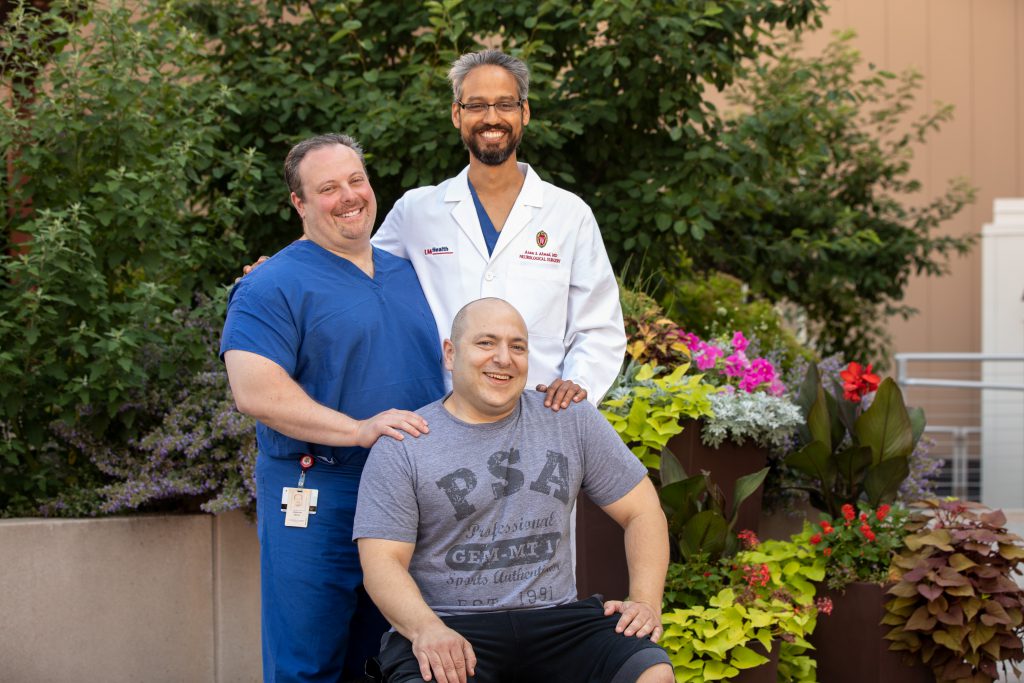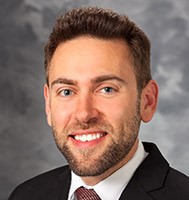
Jordan Dorf of Aurora, Colorado had been walking around with a fatty lump on the side of his face since he was in high school. While typically harmless, these lumps – known as lipomas — can be surgically removed for cosmetic reasons, and Jordan finally decided to have his taken off in the spring of 2019.
Before performing the procedure, Jordan’s physician ordered a routine CT scan which, unexpectedly, revealed a more serious problem.
“All of a sudden, I’m hearing that they see a suspected mass near my brain, and I need an MRI. It knocked the wind out of me,” says Jordan, a process improvement consultant in the financial services industry.
For this 45-year-old father of two kids (ages 12 and 8) — who also is going through a divorce — life was about to be upended once more. The lump on his face would have to wait. It paled in significance to what he learned was a large non-cancerous tumor growing on his pituitary gland, located at the base of the brain. (Known as the body’s “master gland,” the pituitary regulates human growth, metabolism, stress response and many other essential functions.)
Jordan’s tumor had probably been growing for 4 or 5 years. Although he hadn’t told anyone, his peripheral vision had been steadily declining. Reading small type on his computer screen became more of a strain. Looking back, he now knows that his vision problems were caused by the tumor pushing on his optic nerve.
Jordan saw an ophthalmologist, who adjusted his eyeglass prescription, but nobody ever suggested the possibility of a pituitary tumor.
“I wish I would have known enough about pituitary tumors to raise my hand,” he says.
Once he knew his tumor had to be removed, Jordan preferred to find a good neurosurgeon close to home.
Seeking an experienced surgical team
“Unfortunately, the neurosurgeon I saw in Denver did not inspire a lot of confidence,” Jordan says. “Many pituitary tumors are small, and most are non-cancerous, but when the surgeon saw how large mine was, he seemed unsure sure how to treat it.”
After exploring other centers around the country, Jordan sought help from the one person he never hoped to need in a pinch – his friend Josh, otherwise known as UW Health Neurosurgeon Josh Medow, MD, who practices in Madison, Wisconsin, about 1,000 miles from Jordan’s home in Colorado.
“I’ve known Josh since we were friends in high school in the late 1980s,” Jordan says. “I didn’t ever want to need his help for a medical problem, but I wasn’t satisfied with the answers I was getting at home.”
Dr. Medow told Jordan that one of his UW Health neurosurgery colleagues — Azam Ahmed, MD — has extensive experience with a comprehensive team that treats large pituitary tumors. In fact, he said, the UW Health team performs about 100 cases a year on patients like Jordan.
“When Josh said he would go to Dr. Ahmed if he had my tumor, I trusted him implicitly. So, I spoke with Dr. Ahmed by phone and decided to come to Madison for further evaluation.” Within a week, Jordan was seen at University Hospital in Madison by several providers during his first visit.
Less invasive skull base surgery offers patients several benefits
Especially appealing to Jordan was UW Health’s expertise in a less invasive skull base surgery technique in which the surgeons operate endoscopically through the nose rather than opening the skull. In cases like this, Dr. Ahmed’s skull base team typically includes a UW Health Ear, Nose and Throat surgeon, such as Tim McCulloch, MD, or Ian Koszewski, MD. Other UW Health specialists who saw Jordan – such as ophthalmologist Marilyn Kay, MD, and endocrinologist, Vanessa Rein, MD – illustrate the comprehensive nature of care available at centers that offer multi-pronged expertise in every facet of pituitary tumor care.

When it came time for Jordan’s surgery, Dr. Koszewski began the procedure by temporarily moving aside nasal tissue, freeing up more space for Dr. Ahmed to reach and remove the tumor. Then, both surgeons collaborate closely to put everything back together, leaving the patient free of scars or skin incisions. The endoscopic technique also avoids any direct impact to the brain and allows for a much faster patient recovery than open surgery.
Even with a mass as large as Jordan’s, Dr. Ahmed was able to remove close to 95 percent of the tumor operating solely through the nose.
“For maximum safety, we left a small piece of tumor because of its proximity to Jordan’s pituitary gland and hypothalamus,” says Dr. Ahmed. “We will keep a close eye on Jordan, but if necessary, we can remove the small remaining tumor with open surgery at a future date. Jordan also is getting excellent care from Dr. Rein, the UW Health endocrinologist, to manage some hormonal issues. Thankfully, his overall prognosis is excellent.”
Within a few days, Jordan was up and moving, but the first 48 hours after surgery were challenging. Swelling, which is totally normal after surgery, triggered pain, but Jordan was extremely grateful for the unrelenting care he received from the nursing staff.
“My nurse was an angel.”
“I will never forget these nurses who got me through the rough spots,” Jordan says. “Cheyenne (Heidenreich) was one nurse from the Neuro ICU whom I will never forget. She was an angel who helped get me through the first night when I was in more pain than I had ever experienced. I literally couldn’t speak; I could only moan – and Cheyenne was so attentive that she always knew just what to do to make things better. People like Cheyenne truly care. And you know something? Everybody smiles here. They never get surly or defensive or uncooperative. They just give and give, and they listen and solve problems. It’s a cultural thing here and it’s really incredible.”
Thinking back on his decision to travel 1,000 miles for surgery, Jordan has no regrets.
“You want to have complete confidence when someone is operating on your brain, and here they inspired nothing but confidence because they showed nothing but competence. Dr. Ahmed and Dr. Koszewski channel God through their hands, and everybody else on the team was amazing.”
Jordan: Others should know that UW Health delivers world-class care
For someone who spent very little time in hospitals, Jordan has nothing but high praise for his UW Health clinical experience.
As he got to know other UW Health patients and families staying at a nearby hotel, Jordan noticed a remarkably consistent theme.
“Every patient or family member I met described their situation as a health problem that could not be adequately addressed at home,” Jordan says, “Then they came here for treatment or surgery that saved their life.”
Jordan’s advice: ask, ask, ask
Finally, Jordan advises anyone having major health symptoms to ask if something unsuspected might be causing the problem.
“In my case, I thought the problem had to be with my eyes, not a big tumor at the base of my brain,” he says. “My advice is always ask your doctor if something else might be going on. Fortunately, my tumor was discovered before it got any worse, and I could not be more grateful for the care I received at UW Health.”
NOTE: Although Jordan’s pituitary tumor was discovered after he experienced vision problems, there are other symptoms that may be signs of a pituitary tumor, such as sudden severe headaches, facial numbness or pain, unexplained fatigue, mood changes, unexplained weight gain, changes in menstrual cycles in women, erectile dysfunction in men, and others. Don’t hesitate to ask your doctor about pituitary tumors if you experience any of these symptoms.
Read the full article at: https://www.uwhealth.org/brain-tumors/jordans-story-brain-tumors/52929?fbclid=IwAR3nVAafcZ_ovfmA4UsfMB1fhvnFMWc8zgJ4l8j-jhTfd10QrP2UGkcsTgI